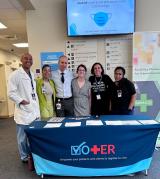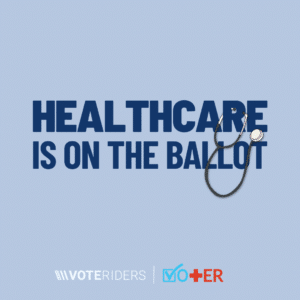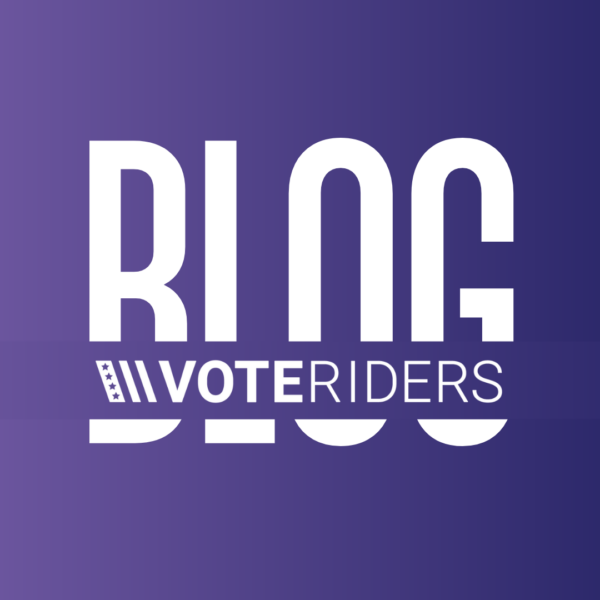
Q&A With Vot-ER's Emily Polak: "A Healthy Community Is Powered By a Healthy Democracy"
In celebration of Civic Health Month, Emily Polak, Vice President of Partnerships and Organizing at Vot-ER spoke with VoteRiders’ Digital Communications Coordinator about Vot-ER’s nonpartisan mission to create “Healthy communities powered by a healthy democracy.” Through collaborations with organizations like VoteRiders, Vot-ER ensures voters not only register but also have the information and support they need to successfully cast a ballot. Emily highlights the profound connection between voting and health, the impact Vot-ER and VoteRiders’ collaborative efforts have on democracy, and the crucial role every vote plays in shaping local and national policies. — AUGUST 19, 2024
Tell me about yourself and your role at Vot-ER
 I’m Emily, Vot-ER’s Vice President of Partnerships and Organizing. The teams I support manage all of our organizing work across the country. Vot-ER is a nonpartisan nonprofit in all 50 states and we have organizers on the ground in eight states.
I’m Emily, Vot-ER’s Vice President of Partnerships and Organizing. The teams I support manage all of our organizing work across the country. Vot-ER is a nonpartisan nonprofit in all 50 states and we have organizers on the ground in eight states.
What is your organization’s mission and what are some of your key initiatives?
Vot-ER’s tagline is, “Healthy communities powered by a healthy democracy.” Vot-ER started in the emergency department space. Our founder, Dr. Alister Martin saw the opportunity to build voter registration kiosks right into emergency rooms so that while people were waiting to be seen, they could register to vote Since then we’ve grown into a network of over 50,000 individual healthcare professionals and over 700 different types of healthcare partners including national groups, such as the American Medical Association and the American College of Physicians, state-level institutions, including hospitals like the Children’s Hospital of Philadelphia, or health systems like Oak Street Health or Valleywise, individual clinics, community health centers, down to individual practitioners, whether they’re community health workers, RNs, MDs, dental therapists, or social workers.
Vot-ER conducts a number of different civic initiatives to support ongoing voter registration efforts and then, once we hit October, get-out-to-vote programming. Our partners can use our free tools to support nonpartisan, HIPAA-compliant voter registration efforts for their colleagues and patients. At the core of our tools are our Vot-ER badges, worn by our partners — healthcare professionals. Eligible voters can use their own phones to scan the QR code on a Vot-ER badge and it takes them to a page where they can register to vote as well as check and update their voter registration. These same tools also make sure that anyone who registers to vote can successfully cast their ballot- in primaries, special, and general elections. We make sure people know where their polling location is and what they need to bring to vote. We want to give explicit direction to these voters, many of whom are voting for the very first time. And it works.
Through evaluation efforts, we’ve learned that people who register to vote through Vot-ER tools turn out to vote at an 11 percentage point higher rate than the general voting population. It’s absolutely linked to the concept that healthcare professionals are deeply trusted as messengers, helping patients and their colleagues understand why voting and health are interconnected. Or, as the AMA has named, why voting is a social determinant of health.
One thing I love about Vot-ER is that we’re reaching people that other electoral campaigns are not. Most of these folks are not already on the voter rolls, they’re new voters who are excited to take their power and vote for their health and the health of their community. We’re meeting people in health institutions and our partners, these trusted messengers, are making sure folks understand that their votes and their voices matter in building a healthier democracy. People are really grateful that we’re reminding them to vote and are providing the information they need regardless of who or what they’re voting for.

Vot-ER operates a small grant-making program where we offer supplemental funds to community health centers to build voter registration efforts into their patient-facing work. Two weeks ago, I visited one of our grantee health centers, the Lynn Community Health Center. It was wonderful to see the healthcare professionals in action, talking to every single patient and person who walked through the front door. It turned out that the very last person we talked to at the end of our visit had just become a citizen two days before. She was carrying around her congratulatory letter from the President, officially proclaiming her as a citizen. She hadn’t registered to vote yet and she just happened to be at Lynn Community Health Center that day for an appointment or to pick up a prescription. She was so grateful and proud to register to vote just two days after becoming a citizen.
That is the essence of Vot-ER’s work — to help people get the tools and resources they need to fully participate in democracy from someone they trust. It was just such a profound moment to witness.
What is the connection between democracy and health?
Communities that have higher voting rates have better health outcomes. For example, communities that have higher voting rates typically have lower rates of mortality, asthma, and diabetes. A number of highly reputable studies demonstrate the connection between higher voter turnout and better health outcomes.
 Voting is a determinant of health because, through voting, individuals and their communities can communicate their health needs — whether it’s through voting for a ballot initiative, a policy, or an elected individual — and these needs will have the opportunity to be addressed and supported. If elected officials don’t hear from their constituents and aren’t aware of what their health needs are, they’re not going to take those needs into account when crafting and voting on policy. Everything Vot-ER does is fiercely nonpartisan. Our resources point people to what’s on their ballot so that they can vote in ways that support their health.
Voting is a determinant of health because, through voting, individuals and their communities can communicate their health needs — whether it’s through voting for a ballot initiative, a policy, or an elected individual — and these needs will have the opportunity to be addressed and supported. If elected officials don’t hear from their constituents and aren’t aware of what their health needs are, they’re not going to take those needs into account when crafting and voting on policy. Everything Vot-ER does is fiercely nonpartisan. Our resources point people to what’s on their ballot so that they can vote in ways that support their health.
How is Vot-ER working with VoteRiders to make sure folks have the ID they need to vote?
We’ve continued to uplift each other’s efforts for as long as we’ve been partners. There aren’t a lot of other organizations that thread the needle between health and democracy, so we’re so grateful to be able to collaborate and be part of other pro-democracy coalitions providing direct services and working on national and state-level policies that can enforce and reinvigorate the connection between health outcomes and democracy.
In addition to working together during Civic Health Month, we also encourage our partners to order VoteRiders’ Voter ID Information Cards in case someone has a question about what kind of ID they need to vote in their state or need help getting one. We also rely on partners like VoteRiders for pro-bono legal guidance when it comes to voter ID since this isn’t something Vot-ER offers.
We are so fired up and enthusiastic about supporting our partners as we continue to head into the various summer primaries, voter registration deadlines, and the General Election on November 5th. We’re ready to see the great impact Vot-ER, VoteRiders, and our partners will have on this year’s election.
How is Vot-ER celebrating Civic Health Month?
People are really ready to dig in this Civic Health Month knowing that November 5th is just around the corner. We’re starting Civic Health Month off with a friendly competition amongst all of our Vot-ER tool users. Every week we’re listing our top two individual Vot-ER badge holders and our top two organizational partners who are doing the most (by way of metrics) to help the largest number of voters get ready to vote.
With VoteRiders, we’ll be hosting a webinar for our community health center grantees so they can feel confident helping their patients, peers, and colleagues get ready to vote. We’re also conducting some basic Vot-ER training sessions to teach folks throughout the country how to use Vot-ER tools and how to have conversations with patients about voting in a way that feels like it’s just a part of a typical social history check-in.
We’re teaching organizations how to build nonpartisan, HIPAA-compliant voter registration programs right into their institutional practices and we also have a Civic Health Month toolkit that we’ve shared with all of our partners to leverage.
What are some of the key issues driving voters in your community to the polls this year?
Reproductive healthcare is on the minds of many voters. There are also some redistricting ballot initiatives out there. We try to drive home that all elections matter and can make a difference — not just the President or other top of the-ticket positions like the Governor. Your local school board and committees also matter. Funding for your community health clinics and educational programs matter. And again, we know that no matter what level you’re voting on, health is on the ballot.
Do voters in your community face any specific barriers to the ballot box?
We know that depending on the state you live in, there are particular restrictions and ID requirements to vote. There are also limitations on early voting and day-of voter registration in certain states. Even though many states have early voting and mail-in voting options, a lot of folks don’t have time off from work to vote. Vot-ER has crafted a toolkit to help our student partners advocate for time off to vote policies so that on Election Day, their academic institution will allow them to take two hours off to go vote. We’ve uplifted a few of our partners who’ve already been successful at achieving this.
Vot-ER also has a Healthy Democracy Campaign where different health professional students (i.e. medical, nursing, public health, social work students, etc.) compete to earn points for different types of actions. For example, hosting a voter registration drive on National Voter Registration Day, organizing rides to the polls, or joining Vot-ER for different ‘Get Out the Vote’ phone banks.
What would you say to someone who told you they feel like their vote doesn’t matter?
There are so many elections in this country that come down to only a thousand, a couple hundred, or even a dozen votes. The presidential election this year is going to be close in so many states so every vote absolutely matters. As for local elections, the turnout rate is typically very small, so quite literally every single vote has the power to determine local funding initiatives, curriculum choices, et cetera.
Every vote absolutely matters and health professionals are exactly the right messengers to help drive that point home as we collectively work to build a healthier democracy.



